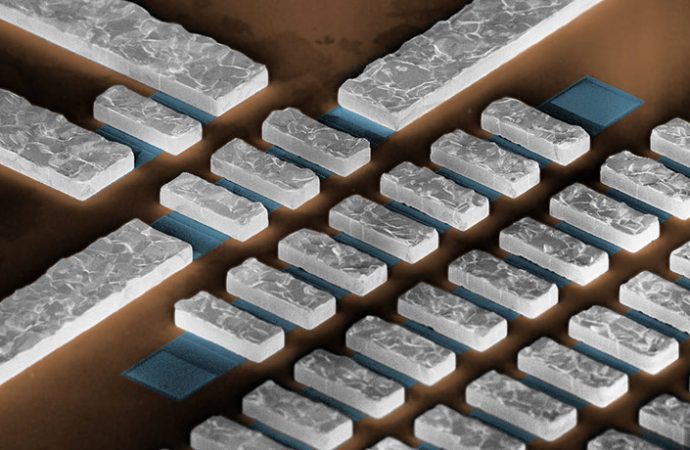For the first time, nanoelectronics have been cooled to below a thousandth of a kelvin
Source: Science Daily
Today’s nanoelectronics weather forecast: positively frigid.
Tiny electronic chips have been cooled to a record low temperature, dipping below a thousandth of a kelvin for the first time ever, scientists reported March 6 at a meeting of the American Physical Society.
To reach the frosty temperature, the scientists incorporated tiny bits of metal on the chip, which act like magnetic refrigerators. When scientists ramped magnetic fields up and down, those tiny refrigerators, made of the metal indium, helped cool the chip’s electrons to about 420 microkelvin — less than half a thousandth of a kelvin.
Other materials have been brought to much lower temperatures than the chilled chips. Clouds of atoms have been cooled to trillionths of a kelvin. But atom clouds are easier to cool than electronic chips, which require outside interaction to operate and have currents running through them that produce heat.
Getting to supercold conditions should bolster certain applications, such as quantum computing, in which scientists make calculations by harnessing the physics of the minuscule atomic world. Warm temperatures cause particles to jostle about, muddling their quantum properties. So many quantum computers are cooled, typically by devices known as dilution refrigerators that can reach a few thousandths of a kelvin. But even lower temperatures could allow particles to retain their quantum properties for a longer period of time.
The ability to reach lower temperatures could also reveal unexpected effects, said physicist Nikolai Yurttagül of the Delft University of Technology in the Netherlands, during a March 5 news conference. For example, in the past, new cooling records allowed scientists to discover the phenomenon of superconductivity — the conduction of electricity without resistance. Further surprises could be in store. “We don’t know yet what to explore, which has its own charm.”

































Leave a Comment
You must be logged in to post a comment.